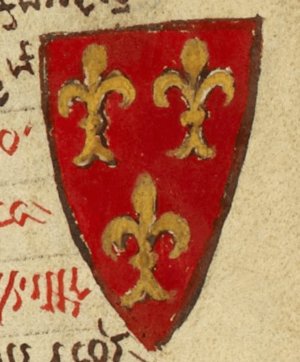Walter de Cantilupe facts for kids
Quick facts for kids Walter de Cantilupe |
|
|---|---|
| Bishop of Worcester | |
 |
|
| Elected | 30 August 1236 |
| Reign ended | 12 February 1266 |
| Predecessor | William de Blois |
| Successor | Nicholas of Ely |
| Orders | |
| Ordination | 18 April 1237 |
| Consecration | 3 May 1237 |
| Personal details | |
| Born | 1195 |
| Died | 12 February 1266 |
| Denomination | Catholic |
Walter de Cantilupe (who died in 1266) was an important Bishop of Worcester during the Middle Ages. Bishops were leaders in the church, like a spiritual guide for a large area.
Contents
Walter de Cantilupe's Early Life
Walter de Cantilupe came from a family that served the king very loyally. His father, William I de Cantilupe, and his older brother, William II de Cantilupe, were known for being faithful to King John of England. This loyalty sometimes made them unpopular because King John himself was not always liked.
Starting a Career in Government
At first, Walter followed his father's path. He worked for the Exchequer, which was like the government's finance department. He also served as a traveling judge, known as an "itinerant Justice," during the early years of King Henry III's rule. This meant he traveled around to hear legal cases.
Becoming a Bishop
Even while working for the government, Walter also joined the church. In 1236, he was chosen to become the Bishop of Worcester. He was officially elected on August 30, 1236. He then became a deacon on April 4, 1237, and a priest on April 18, 1237. Finally, he was made a bishop on May 3, 1237.
Walter de Cantilupe as Bishop
As a bishop, Walter de Cantilupe strongly supported making the church better. He joined a group of church leaders who wanted to reform things. This group was led by important figures like Edmund Rich and Robert Grosseteste.
Challenges with the Pope and King
Like his leaders, Bishop Cantilupe faced a difficult choice. He believed the papacy (the Pope's authority) was a divine institution, meaning it came from God. However, he disagreed with how Pope Gregory IX and Pope Innocent IV were dealing with the English church. He felt they were making unfair demands.
Over time, Bishop Cantilupe became convinced that many problems came from the king and the Pope working together in ways that were not always right.
Leading Church Reforms
In 1240, Bishop Cantilupe led an important meeting called the Synod of Worcester. During this meeting, he introduced many new rules and ideas to improve the church. He spoke out against the Pope's demands for money from England. After Robert Grosseteste died in 1253, Walter de Cantilupe became the main voice for the English clergy (church leaders) who wanted more independence.
Role in Political Changes
In 1258, at a special meeting of the parliament in Oxford, Walter de Cantilupe was chosen by the people's side to be on a committee. This committee of twenty-four people was tasked with reforming how the government was run. From that time on, he was a very important person in the group of nobles who wanted to change the king's administration.
When a civil war broke out, Bishop Cantilupe supported Simon de Montfort, 6th Earl of Leicester. Simon de Montfort was a powerful noble who led the fight against the king. Through his nephew, Thomas de Cantilupe, who was then the Chancellor of Oxford University, Bishop Cantilupe even convinced the university to support Simon de Montfort's side.
Supporting Simon de Montfort
Bishop Cantilupe was present at the Battle of Lewes, a major battle where Simon de Montfort's forces won. He blessed Montfort's soldiers before they fought the king's army. He also hosted de Montfort the night before the final battle, the Battle of Evesham, where Montfort was defeated. Even during Montfort's time in power, Bishop Cantilupe mostly worked to bring peace and mediate between different groups.
Walter de Cantilupe's Legacy
Walter de Cantilupe passed away on February 12, 1266. He was respected by everyone, no matter which side they supported in the political conflicts. While he might not have been as strong-willed or versatile as Grosseteste, he was greatly admired for his strong moral character. He is remembered as one of the few leaders of his time who truly worked for what he believed was right, without seeking personal gain.
 | Janet Taylor Pickett |
 | Synthia Saint James |
 | Howardena Pindell |
 | Faith Ringgold |

